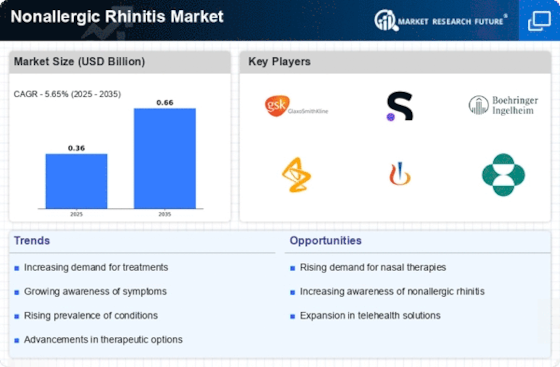Rising Healthcare Expenditure
The increase in healthcare expenditure is a pivotal driver in the Nonallergic Rhinitis Market Industry. As countries allocate more resources to healthcare, there is a corresponding rise in spending on treatments for various conditions, including nonallergic rhinitis. This trend is particularly evident in regions where healthcare systems are evolving to provide better access to medications and therapies. Higher healthcare spending often translates to improved patient access to innovative treatments and diagnostic tools, which can enhance the management of nonallergic rhinitis. Additionally, as patients become more willing to invest in their health, the demand for effective therapies is likely to rise. This growing expenditure is expected to bolster the Nonallergic Rhinitis Market Industry, fostering an environment conducive to market expansion.
Impact of Environmental Factors
Environmental factors play a crucial role in the Nonallergic Rhinitis Market Industry. Urbanization and pollution are contributing to an increase in nonallergic rhinitis cases, as individuals are exposed to various irritants and pollutants. Studies suggest that exposure to environmental triggers, such as smoke, strong odors, and chemical fumes, can exacerbate symptoms. This growing awareness of environmental influences is prompting individuals to seek treatment options, thereby driving market growth. Furthermore, as cities continue to expand and pollution levels rise, the prevalence of nonallergic rhinitis is expected to increase, further impacting the demand for effective therapies. The interplay between environmental factors and health is likely to shape the future landscape of the Nonallergic Rhinitis Market Industry.
Advancements in Pharmaceutical Research
Innovations in pharmaceutical research are propelling the Nonallergic Rhinitis Market Industry forward. Recent developments in drug formulations and delivery systems have led to the introduction of more effective treatments. For instance, new intranasal corticosteroids and antihistamines are being formulated to provide quicker relief with fewer side effects. The market is witnessing a surge in research aimed at understanding the underlying mechanisms of nonallergic rhinitis, which could lead to the discovery of novel therapeutic targets. This focus on research and development is likely to enhance treatment options available to patients, thereby increasing market competitiveness. As pharmaceutical companies invest in this area, the Nonallergic Rhinitis Market Industry is expected to expand, offering a wider array of solutions for those affected.
Growing Demand for Over-the-Counter Products
The demand for over-the-counter (OTC) products is a significant driver in the Nonallergic Rhinitis Market Industry. Many individuals prefer self-medication for managing mild symptoms, leading to a rise in the availability and sales of OTC medications. This trend is particularly evident in regions where access to healthcare services may be limited. The convenience of purchasing OTC products without a prescription appeals to consumers, resulting in increased market penetration. Additionally, marketing strategies that emphasize the efficacy and safety of these products contribute to their popularity. As more consumers turn to OTC solutions for relief, the Nonallergic Rhinitis Market Industry is likely to experience substantial growth, reflecting changing consumer preferences.
Increasing Prevalence of Nonallergic Rhinitis
The rising incidence of nonallergic rhinitis is a notable driver in the Nonallergic Rhinitis Market Industry. Studies indicate that approximately 20% of the population experiences symptoms related to this condition, which can lead to significant discomfort and reduced quality of life. As awareness grows, more individuals seek medical advice, resulting in increased diagnoses. This trend is further supported by the fact that nonallergic rhinitis can affect people of all ages, making it a widespread concern. Consequently, healthcare providers are more likely to recommend treatments, thereby expanding the market for therapeutic options. The increasing prevalence is likely to stimulate demand for both over-the-counter and prescription medications, contributing to the overall growth of the Nonallergic Rhinitis Market Industry.


















Leave a Comment